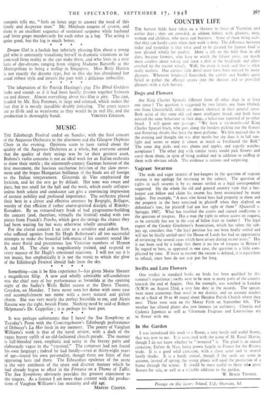MUSIC
THE Edinburgh Festival ended on Sunday, with the final concert of the Augusteo Orchestra in the afternoon and the Glasgow Orpheus Choir in the evening. Opinions seem to have varied about the quality of the Augusteo Orchestra as a whole, but everyone agreed that the quality of their strings was by far their greatest asset. Brahms's violin concerto is not an ideal work for an Italian orchestra to show their mettle ; the nineteenth-century German heroism of the first movement, the luscious saccharine lyricism of the slow move- ment and the bogus Hungarian brilliance of the finale are all foreign to the Italian temperament. Gioconda de Vito emphasised the lyricism, and let the rest go by default. Her tone was sweet and pure, but too small for the hall and the work, which easily collapses unless both soloist and conductor can give a convincing impression of earnest nobility and profound importance. The orchestra played their best in a clever and effective overture by Respighi, Belfagor, worthy of that efficient if rather coarse-grained disciple of Rimsky- Korsakov. By an extraordinary freak of bad programme-building the concert (and, therefore, virtually the festival) ended with two pieces from Franck's Psyche, which gave the strings the chance they had been waiting for but were otherwise wholly unsuitable.
For the choral concert I sat ilext to a sensitive and ardent Scot, who suffered agonies from Sir Hugh Robertson's all too successful attempts to make the beautiful folk-music of his country sound like the more florid and pretentious late Victorian numbers of Hymns A. and M. The choir is magnificently trained, and respond to every nuance of Sir Hugh's emotional reactions. I will not say it is not music, but emphatically it is not the music to which the glow
of the Edinburgh Festival should fade from the sky. * * * Something—can it be film experience ?—has given Moira Shearer a magnificent fillip. A new and wholly admirable self-confidence was the chief note of her performance as Swanilda at the opening night of the Sadler's Wells Ballet season at the Davis Theatre, Croydon, on Monday. I have never seen her dance with more ease and accomplishment nor mime with a more natural and girlish charm. She was very nearly the perfect Swanilda to me, and Alexis Rassine was the right, boyish Franz. Nothing need be said of Robert Helpmann's Dr. Coppelius ; it is perhaps his best part. * * * *
It was perhaps unfortunate that I heard the Sea Symphony at Tuesday's Prom with the Concertgebouw's Edinburgh performance of Debussy's La Mer fresh in my memory. The poetry of Vaughan Williamss work is that of the naval review, with a dash of the vague breezy uplift of an old-fashioned church parade. The manner is full-blooded 1910, emphatic and noisy in the breezy parts and elaborately vague in the "mystical." The composer had not found his own language ; indeed he had hardly—even at thirty-eight years of age—found his own personality, though there are hints of that appearing here and there. The Edwardian opulence of the score 4 the very antithesis of the spare and discreet manner which he had already begun to affect in the Fantasia on a Theme of Tallis. The Sea Symphony obviously provides the greatest enjoyment to the singers. As a listener I am more than content with the produc- tions of Vaughan Williams's late maturity and old age.
MARTIN COOPER.


































 Previous page
Previous page